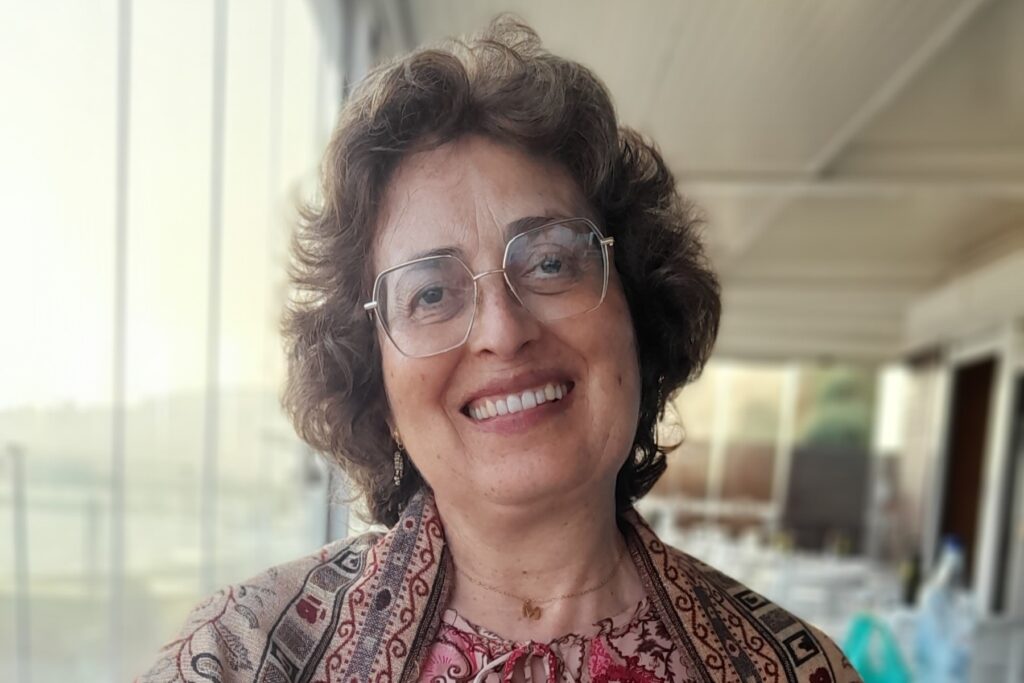
This month, we spoke with Marcela Candeias, member of the ELF Aspergillosis Patient Advisory Group (PAG). She shares the difficulties she has faced to get a diagnosis, the importance of advocacy and her belief that knowledge is power.
My name is Marcela Candeias. I am a lawyer from Alentejo, Portugal, and I share an office with my husband, who is also a lawyer. For most of my life, I lived actively and healthily. Although I had asthma since the age of 14, it was always under control. I worked long hours, travelled often and rarely had to think about my health. That all changed in 2020.
In 2020, everything began to shift. I started coughing constantly, and no matter how many different face masks I tried, the cough only became worse. I was feeling exhausted and started to lose weight. The mucus I coughed up changed colour from green to black, and I began to have intense coughing fits. One of these fits lasted several hours, and that was when I knew something was seriously wrong.
During the breaks between COVID-19 lockdowns, I managed to see a pulmonologist. I was told it was just my asthma and advised to continue with my regular medication, but the symptoms kept escalating. I felt that no one was really listening to me. Eventually, I saw another pulmonologist who took my concerns more seriously and ordered some tests.
A week later, the results showed that parts of my lungs were filled with consolidated mucus, and there were signs of bronchiectasis which led to a bronchoscopy.
A bronchoscopy allows doctors to look directly into the airways using a flexible camera inserted through the nose and into the lungs. It helps them understand what might be causing unexplained symptoms.
In my case, the procedure revealed 2 types of fungi, Aspergillus fumigatus and Aspergillus Niger, as well as bacteria in my lungs. I was diagnosed with Allergic Bronchopulmonary Aspergillosis (ABPA). It was a relief to finally have an explanation, but it was also frightening to be diagnosed with a rare disease I had never even heard of.
The diagnosis turned my life upside down. Before, I had always considered myself a healthy person with a full life. Now, everything revolves around managing my condition.
I have taken many courses of antibiotics and antifungals and experience regular flares. The side effects of my medication are often difficult to manage.
I experience tremors, swelling in my face and lips, muscle and joint pain, difficulty sleeping, depression, confusion, mood swings, headaches, anxiety and an overwhelming sense of exhaustion. My skin is often red and burns as if it has been sunburnt.
The hardest part is not just the symptoms, but the limitations that come with them. Since my diagnosis, I have had long periods when I could not work, and I have had to give up travelling and many of the activities I once loved. My whole life has had to be restructured around the illness.
I try to hold onto what I can. I still practice yoga and Pilates when I am able and I try to do my best each day, even when the challenges feel overwhelming.
The doctor who diagnosed me was a huge support; he saved my life! Unfortunately, awareness of aspergillosis in Portugal is very low. At the beginning, my husband and I felt completely alone. There was no support available locally, and we had to find our own way.
We did a lot of research and that is how I found the National Aspergillosis Centre (NAC) in the UK.
Everything I know about ABPA, I have learnt through NAC and the support group. I am so grateful to be a part of that group and feel enormous affection for everyone in it. I also found the Aspergillosis Trust Support Group, and they have become a daily source of comfort and friendship.
These communities are now part of my extended family. They offer information and a sense of belonging that means everything when you are dealing with a rare and complex illness.
I had a meeting with Lisa from the Aspergillosis Trust Support Group. I told her I wanted help to raise awareness of aspergillosis in Portugal where so few people, even doctors, seem to know about it.
After that conversation, I was invited to join the European Lung Foundation (ELF) Patient Advisory Group. It felt like a natural next step and an opportunity to use my experience to support others and advocate for better awareness across Europe.
When people understand what this disease is, they are better able to recognise symptoms and ask the right questions. It empowers patients and helps doctors provide better care.
Knowledge is power! It gives you the confidence to speak up, to understand your treatment options and to push for the support you need.
I would say to do your research and ask lots of questions. Join groups like ELF’s Patient Advisory Group (PAG), NAC or the Aspergillosis Trust Support Group.
Remember that knowledge is power, and you are not alone.
Despite being a long-term, rare and debilitating disease, I believe it is possible to find balance and have a normal life.
“A different kind of normal”. It is a path of learning, self-knowledge, and growth. It is not easy, but with the right support, it is possible.